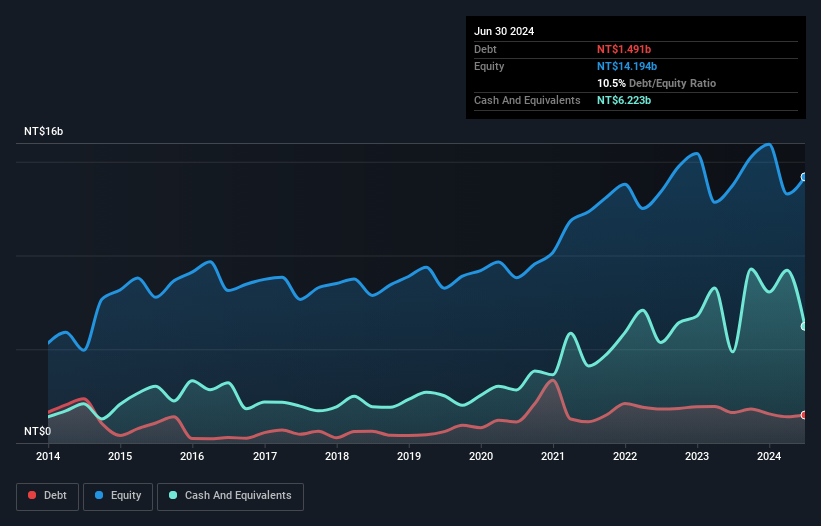We Think Makalot Industrial (TWSE:1477) Can Manage Its Debt With Ease

Warren Buffett famously said, 'Volatility is far from synonymous with risk.' So it seems the smart money knows that debt - which is usually involved in bankruptcies - is a very important factor, when you assess how risky a company is. We note that Makalot Industrial Co., Ltd. (TWSE:1477) does have debt on its balance sheet. But should shareholders be worried about its use of debt?
When Is Debt Dangerous?
Debt assists a business until the business has trouble paying it off, either with new capital or with free cash flow. Part and parcel of capitalism is the process of 'creative destruction' where failed businesses are mercilessly liquidated by their bankers. While that is not too common, we often do see indebted companies permanently diluting shareholders because lenders force them to raise capital at a distressed price. By replacing dilution, though, debt can be an extremely good tool for businesses that need capital to invest in growth at high rates of return. The first step when considering a company's debt levels is to consider its cash and debt together.
View our latest analysis for Makalot Industrial
What Is Makalot Industrial's Debt?
You can click the graphic below for the historical numbers, but it shows that Makalot Industrial had NT$1.49b of debt in June 2024, down from NT$1.62b, one year before. However, its balance sheet shows it holds NT$6.22b in cash, so it actually has NT$4.73b net cash.

How Strong Is Makalot Industrial's Balance Sheet?
According to the last reported balance sheet, Makalot Industrial had liabilities of NT$8.70b due within 12 months, and liabilities of NT$392.9m due beyond 12 months. On the other hand, it had cash of NT$6.22b and NT$4.26b worth of receivables due within a year. So it actually has NT$1.38b more liquid assets than total liabilities.
Having regard to Makalot Industrial's size, it seems that its liquid assets are well balanced with its total liabilities. So it's very unlikely that the NT$91.3b company is short on cash, but still worth keeping an eye on the balance sheet. Succinctly put, Makalot Industrial boasts net cash, so it's fair to say it does not have a heavy debt load!
And we also note warmly that Makalot Industrial grew its EBIT by 12% last year, making its debt load easier to handle. When analysing debt levels, the balance sheet is the obvious place to start. But ultimately the future profitability of the business will decide if Makalot Industrial can strengthen its balance sheet over time. So if you're focused on the future you can check out this free report showing analyst profit forecasts.
Finally, a business needs free cash flow to pay off debt; accounting profits just don't cut it. Makalot Industrial may have net cash on the balance sheet, but it is still interesting to look at how well the business converts its earnings before interest and tax (EBIT) to free cash flow, because that will influence both its need for, and its capacity to manage debt. Over the last three years, Makalot Industrial recorded free cash flow worth a fulsome 86% of its EBIT, which is stronger than we'd usually expect. That positions it well to pay down debt if desirable to do so.
Summing Up
While it is always sensible to investigate a company's debt, in this case Makalot Industrial has NT$4.73b in net cash and a decent-looking balance sheet. And it impressed us with free cash flow of NT$5.5b, being 86% of its EBIT. So we don't think Makalot Industrial's use of debt is risky. The balance sheet is clearly the area to focus on when you are analysing debt. However, not all investment risk resides within the balance sheet - far from it. Case in point: We've spotted 1 warning sign for Makalot Industrial you should be aware of.
When all is said and done, sometimes its easier to focus on companies that don't even need debt. Readers can access a list of growth stocks with zero net debt 100% free, right now.
New: Manage All Your Stock Portfolios in One Place
We've created the ultimate portfolio companion for stock investors, and it's free.
• Connect an unlimited number of Portfolios and see your total in one currency
• Be alerted to new Warning Signs or Risks via email or mobile
• Track the Fair Value of your stocks
Have feedback on this article? Concerned about the content? Get in touch with us directly. Alternatively, email editorial-team (at) simplywallst.com.
This article by Simply Wall St is general in nature. We provide commentary based on historical data and analyst forecasts only using an unbiased methodology and our articles are not intended to be financial advice. It does not constitute a recommendation to buy or sell any stock, and does not take account of your objectives, or your financial situation. We aim to bring you long-term focused analysis driven by fundamental data. Note that our analysis may not factor in the latest price-sensitive company announcements or qualitative material. Simply Wall St has no position in any stocks mentioned.
About TWSE:1477
Makalot Industrial
Engages in the design, manufacture, and sale of garments for men, women, and children in Taiwan.
Flawless balance sheet with acceptable track record.
Market Insights
Community Narratives




